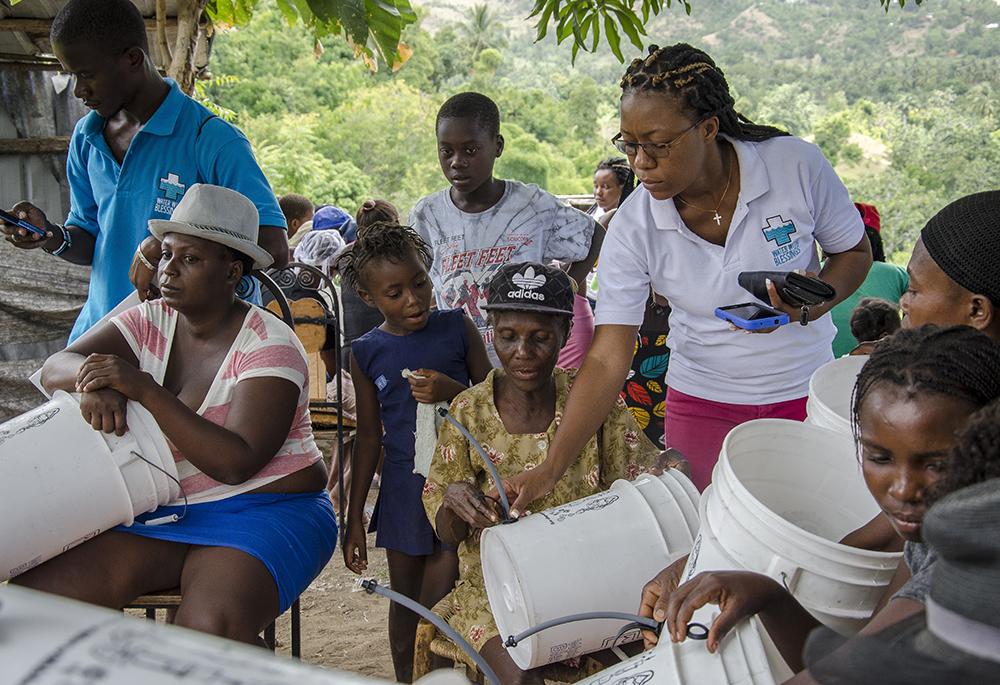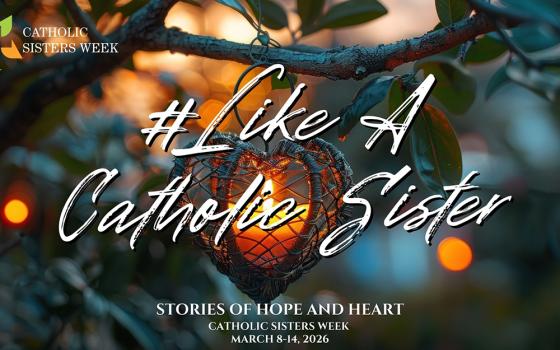
A Water With Blessings teacher in Anse-a-Veau, Haiti, collects GIS data and checks on hardware installation at the end of a 2018 training. (CNS/Courtesy of Water With Blessings/Corey Ohlenkamp)
The sister-led ministry Water With Blessings is changing its name to "Water By Women."
In a recent announcement of the change, the Kentucky-based ministry said it was time "to shine a new, bright light on our mission," saying the change of name reinforces its mission of empowering women "as agents of safe water for their families and communities."
"Everything else about our work remains the same, because our mission has always been 'water by women' — women empowered to share the blessing of safe water with their neighbors," the announcement said. "All over the thirsty world, women are ready to be the change they want to see: safe drinking water for their children and families."
In a Nov. 29 news release, the ministry, whose executive director is Ursuline Sr. Larraine Lauter, the co-founder of the organization, said at an August meeting, its board of directors agreed to change the name "to clearly express a unique mission now in its 16th year of operation, a name which states the mission itself: Water By Women."
The ministry has enrolled more than 175,000 "Water Women" in 48 countries since its founding in 2008. The women leaders are provided with an advanced water filter system guaranteed for a lifetime if properly maintained, the organization said, and attend a three-hour training session. They are also registered with a Geographic Information Systems program, allowing for mapped verification and data collection.
Among the ministry's accomplishments, it says, is the eradication of cholera in multiple communities across Haiti.
The announcement added: "Women are the great untapped resource of the developing world. Two billion people now live without access to safe, healthy water, nearly all in communities where there are no engineers, i.e. communities without any realistic hope of water treatment infrastructure.
"Every thirsty community has a wealth of smart, motivated women who are ready to be the change they want to see: safe water for their families and communities," the announcement said. "Safe drinking water is the greatest source of positive change for any community. Safe water for all community members means radical improvements to community health, supporting economic growth and prosperity."
Advertisement
UISG meeting focuses on communications
More than 600 women and men united in the mission of communicating about women's religious life participated in the first international "Meeting on Communication in Religious Life" from Nov. 27 through Dec. 4.
The series of mostly online programs, but also some in-person events in Rome, was organized by the International Union of Superiors General, or UISG, and sponsored in part by the Conrad N. Hilton Foundation, one of the major funders of Global Sisters Report.
It aimed to foster professional development for more effective and efficient communication, and to provide opportunities for networking.
Congregations mark International Day of Persons with Disabilities
Congregations, humanitarian organizations and the United Nations united to mark International Day of Persons with Disabilities, which was held Dec. 3.
The day is recognized "for the celebration of the achievements of people living with disabilities across the world," noted Salesian Missions, the U.S. development arm of the Salesians of Don Bosco, which supports people with disabilities in a number of countries, including India, Mexico, Mongolia and Vietnam.
An estimated 1.3 billion people — about 16% of the global population — currently experience significant disability, according to the World Health Organization.
Of those, the Salesians said, nearly 250 million "are living with a mental or neurological condition, and almost two-thirds of these people will not seek professional medical help, largely due to stigma, discrimination, and neglect."
"Children and older adults with disabilities often lack the same opportunities as their peers," Fr. Timothy Ploch, interim director of Salesian Missions, said in a statement. "Salesian programs around the globe facilitate social and educational projects that pave the way for advanced research, learning and innovation that aid the inclusion of people with disabilities."
Among the sister-led ministries in the United States to those with disabilities are those by the Felician Sisters, with programs in New Jersey and Pennsylvania.
The congregation said it believes "that all persons, as children of God, are created for a sacred purpose and deserve to be treated with dignity and respect. In our ministries serving individuals with disabilities, we foster an environment that celebrates each person's individuality and encourages their unique potential."







